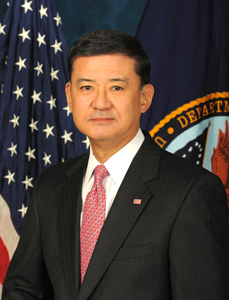
Eric Shinseki
By Pauline Jelinek
Associated Press
WASHINGTON – The top official for the health care of veterans resigned Friday amid a firestorm over reported delays in care and falsified records at veterans hospitals.
Veterans Affairs Secretary Eric Shinseki said he has accepted the resignation of Robert Petzel, the department’s undersecretary for health care, effective immediately. Shinseki had asked for the resignation, a department official later said on condition of anonymity.
Reports of long waits for appointments and processing benefit applications have plagued the VA for years. The agency has shortened backlogs, but allegations that veterans have died while awaiting VA care have created an election-year uproar.
A former clinic director at the VA’s medical center in Phoenix told a House committee last month that up to 40 people may have died while awaiting appointments and that VA officials kept a secret appointment list to mask the delays.
Shinseki asked the VA’s inspector general to investigate the clinic director’s charges.
An initial review of 17 people who died while awaiting appointments at the Phoenix hospital found that none of their deaths appeared to have been caused by delays in treatment, acting inspector general Richard Griffin told senators Thursday. But he also said new complaints about wait lists and falsified patient appointments had surfaced at other VA hospitals and clinics after the Phoenix allegations came to light.
At least 10 new allegations about manipulated waiting times and other problems have surfaced in the past three weeks, he said.
Rep. Jeff Miller, R-Fla., chairman of the House Veterans’ Affairs Committee, mocked the announcement of Petzel’s resignation, calling it “the pinnacle of disingenuous political doublespeak” since Petzel had been scheduled to retire this year anyway.
The American Legion, which has called for Shinseki to resign, said pretty much the same thing, “This move by VA is not a corrective action, but a continuation of business as usual.”
The White House said President Barack Obama supports Shinseki’s decision on Petzel and thanks Petzel for his service.
“As the president has said, America has a sacred trust with the men and women who have served our country in uniform and he is committed to doing all we can to ensure our veterans have access to timely, quality health care,” said a White House statement.
The announcement of Petzel’s resignation came a day after Shinseki and Petzel were grilled at a four-hour hearing of the Senate Committee on Veterans’ Affairs, where lawmakers and veteran groups expressed exasperation over long-standing problems at the department.
Meanwhile, House Republicans scheduled a vote for Wednesday on legislation that would give Shinseki more authority to fire or demote senior executives and administrators at the agency and its 152 medical centers.
When senior leaders in the VA “fail the men and women who have put their lives on the line for our country, they deserve a pink slip — not a bonus,” House Speaker John Boehner said Friday. While some Republicans in Congress have joined the call for Shinseki to resign, Boehner is not among them.
Petzel was scheduled to retire this year, and Shinseki last fall had convened a commission to recommend candidates for presidential appointment to be the new undersecretary. The VA is required by law to convene a commission to seek and review candidates for the position.
Petzel had agreed to remain until the Senate confirmed a replacement. Obama this month announced his intent to nominate Dr. Jeffrey Murawsky to be undersecretary for health.
“As we know from the veteran community, most veterans are satisfied with the quality of their VA health care, but we must do more to improve timely access to that care,” Shinseski said in a statement announcing Friday that Petzel was leaving.
In his position, Petzel oversaw what officials say is the largest health care delivery system in the United States.
The VA operates 1,700 hospitals, clinics, and other facilities around the country.
The U.S. Department of Veterans Affairs employs about 300,000 people and serve about 6.5 million veterans and other beneficiaries each year. (end)



